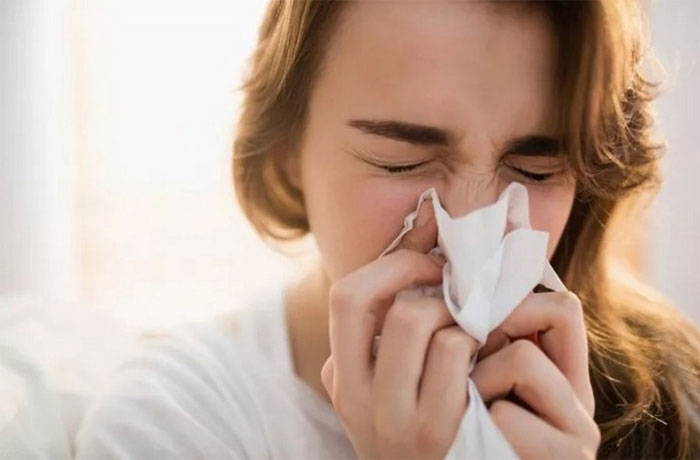Why can the common cold sometimes kill people?
If the subjective feeling of the illness is as small as a cold, you may end up paying a heavy price for life.
Most people know that flu can be fatal. This is true when the Spanish flu killed 50 million people in 1918, more than the number of deaths during World War II. But with the common cold, is this disease enough to kill you?

The common cold will go away on its own after a few days without treatment.
Colds are a collection of symptoms such as coughing, sneezing, runny nose, fatigue and fever . Although it has many characteristics similar to the flu, this is a very different form of infection. Rhinovirus is a common virus that causes the common cold. It causes about half of all colds and the rest is caused by other viruses like adenovirus, influenza virus, respiratory syncytial virus and parainfluenza virus.
The common cold is a mild illness and can go away on its own after a few days without treatment. And because of this nature, most people don't usually worry about catching a cold. However, that is when they do not know the unexpected information about the cold virus.
Infection with Rhinovirus or other cold viruses can cause serious, even fatal complications, especially in people with weakened immune systems.
For example, many studies have shown that patients who undergo bone marrow transplantation may have a higher risk of serious respiratory infections. Although rhovovirus is not considered a major cause of this condition, viruses that cause colds such as RSV, adenovirus and parainfluenza virus are closely related.
Of course, there are many reasons why a person may become seriously ill after a viral infection through the respiratory tract. Certain viruses like adenovirus can also cause gastrointestinal, urinary and liver symptoms.

There are many reasons why a person may become seriously ill after a viral infection through the respiratory tract.
Other viruses, such as the influenza virus, can cause severe pneumonia, but even bacterial pneumonia can lead to serious complications.
Bacterial infections caused by viruses are one of the risk factors that can lead to death. Although the exact mechanism is not clear why bacteria can be infected by the virus. However, by some conjecture, it may come from a large number of bacteria attaching to lung cells. For example, rhovovirus has been shown to increase the presence of a receptor called PAF-r in lung cells. This provides an opportunity for bacteria such as Streptococcus pneumoniae, which can bind to cells and increase the risk of pneumonia.
The risk of death is higher in some people
Unfortunately, colds always cause serious symptoms in children and the elderly. Older adults are more likely to get serious infections than adults or young children. Especially those who have a habit of smoking or indirect exposure to tobacco are also at risk of catching a cold and experiencing serious symptoms.
Another group of people most likely to be affected by the cold virus infection are people with lung diseases, such as asthma, chronic obstructive pulmonary disease. Infection with the virus that causes inflammation of the airways will make breathing much more difficult.

One of the best ways to avoid a cold is to wash your hands properly.
Although most of these cases can be treated with antibiotics. Antibiotics sometimes fail to protect against all viruses. Whereas with highly contagious and serious illnesses like influenza, we have vaccines to treat them thoroughly.
Obviously, there is no major factor determining the severity of a cold virus infection. However, just by meeting the necessary conditions, a cold can absolutely threaten your life.
So the room is better than avoided . One of the best ways to avoid a cold is to wash your hands properly . This seemingly simple action can help prevent the spread of many dangerous bacteria and viruses.
Most people, including healthy ones, need to be extremely cautious about factors that can cause colds, such as weather and the environment. It is important to have adequate nutrition to boost the immune system, always actively wearing a mask when outdoors and in crowded places to avoid viral infections. And if you have a bad chance of catching a cold, see your doctor for timely treatment.
- Foods to eat when you have a cold
- The difference between flu and a cold
- Pathological vigilance is easy to encounter when the weather is severe and cold
- The reason you are always cold
- The south continued to be cold and full of fog
- How is the cold weather damage?
- 'Eat - wear - stay' helps you kill mosquitoes thoroughly
- Mistakes when eating vegetables many people suffer
- Taiwan: 52 people died in a terrible cold spell
- Instructions on how to preserve cold rice so that it is not harmful to health
- Nearly 500 people died in Europe because of the cold
- Cold tolerance of humans
- Cold prices still raging, hundreds of people died
- How does the record cold in China affect Vietnam?
 Green tea cleans teeth better than mouthwash?
Green tea cleans teeth better than mouthwash? Death kiss: This is why you should not let anyone kiss your baby's lips
Death kiss: This is why you should not let anyone kiss your baby's lips What is salmonellosis?
What is salmonellosis? Caution should be exercised when using aloe vera through eating and drinking
Caution should be exercised when using aloe vera through eating and drinking